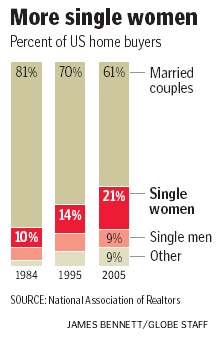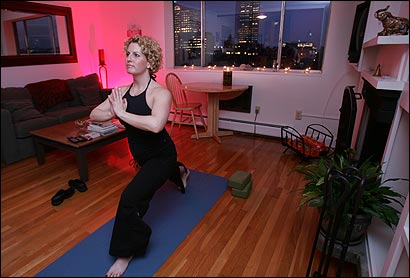Julie Ravech's $100,000-plus salary and independent streak have taken her on solo trips to southern Africa, Spain, and Costa Rica in the past few years.
Those traits also led Ravech, 34, to buy a half-million-dollar condominium in the Back Bay in 2004, also alone.
''If I had someone to share it with, the experience would have been great, but I don't want to miss out," she said.
In the 1970s and 1980s, women streamed into the workforce. In the 1990s, they pursued equal treatment in their jobs. Today, they buy real estate.
Single and divorced women accounted for 21 percent of US house buyers last year, matching 2003's record and up from 14 percent in 1995, according to the National Association of Realtors' 2005 Profile of Home Buyers & Sellers released last month. In Massachusetts, where unusually high house prices make it difficult to afford property on one income, single women were 15 percent of 2005 buyers.
Nationally, surging participation of single women in the housing market offsets the shrinking role of married couples, who have slipped from 70 percent to 61 percent of US buyers since 1995. The proportion of single male buyers, at 9 percent, was unchanged.
Single women ''are delaying marriage, but not real estate," said Fred Meyer, a Cambridge real estate agent for 43 years. According to the Census Bureau, the median age at first marriage for women rose from 20.8 years in 1970 to 25.1 years in 2000.
More single women shopping for housing added extra demand during the boom. Now that the market is cooling, single women will continue to be an important segment of the market, agents and analysts said. Their impact is critical in Massachusetts, where slow or negative population growth saps the housing market.
''If we have a good year, we grow 0.4 percent" in population, said Wellesley College economics professor Karl Case. ''Florida and Arizona grow 4 percent a year."
Financial planner Sharon Rich advises many women who describe a psychological barrier to buying a home. Hoping to meet a mate, they delay a decision until their 30s or even 40s. ''That Prince Charming myth really lasts for a long time," said Rich, whose Belmont firm, Womoney, caters to women.
Boston-area women overcame the myth as they watched property owners make steady gains on soaring house prices in the last decade. ''It's the sense of the market going up and [women] thinking, 'Am I missing out on that movement?' " Rich said.
Paul Bishop, research manager for the National Association of Realtors, said its data show that home ownership is expanding among women in all age groups: Divorced women with careers have money to buy; elderly women are living longer; and young women, like men, increasingly view homeownership as an investment. ''They look back and see how their own parents benefited financially," he said.
Although women continue to earn less on average than men, more women than ever are able to buy houses. Earnings of women with a bachelor's degree or higher increased nearly 15 percent since 1990, while earnings of men with college degrees rose 10 percent, the US Bureau of Labor Statistics' 2004 data show.

For high school graduates, women's earnings rose by 11 percent, while
men's earnings barely grew. Women also have more financing options
today, such as special mortgages for first-time home buyers.
Record-high Massachusetts house prices have begun to shut some single women out of homeownership, said John Dulczewski, spokesman for the Massachusetts Association of Realtors. ''Today's prices in many communities require two incomes to support a mortgage," he said.
Ravech, a 1993 graduate of Emory University in Atlanta, has earned five promotions in her decade-long career, becoming a vice president in December.
She is a Type A personality who also believes in balance, waking up at 5 a.m. to squeeze in a swim and walking on weeknights to Back Bay restaurants like Papa-Razzi to dine with a girlfriend, she said over Caesar salad and a sweet potato at Abe & Louie's, a five-minute walk from her condo.
Prior to buying her one-bedroom condo on Beacon Street, she rented a Back Bay studio. Her purchase was set in motion by the apartment owner's plan to sell the unit.
Investigating whether to buy made Ravech realize that she could do it, although an inspection turned her off to the studio. She started looking.
On July 15, 2004, she bought her $460,000 condo, which launched her on an emotional roller coaster. As she prepared to sign the closing papers, she panicked. ''I'm going to write the biggest check of my life!" she said to her father, a lawyer, who handled her closing. She then poured $50,000 into renovations.
''The first time I went to the design center, I came home, and I just started crying," she said. ''It was ridiculous."
Her efforts transformed a small living room into a breezy loft space with a granite-topped counter separating it from a sleek, new kitchen.
She loves her condo's striking view of the neon signs that dot Boston's skyline. Yet, the experience of buying property alone has been bittersweet.
''With any type of achievement as a single woman, there's a sadness," she said, ''because it's you alone."
Kimberly Blanton can be reached at blanton@globe.com.
© Copyright 2006 Globe Newspaper Company.
